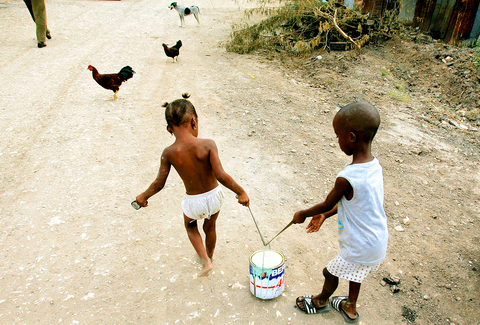The first time I arrived in Kingston, Jamaica, I was prepared for disappointment. It was 1996, and the city could hardly be expected to look as it had in The Harder They Come, the classic reggae film of the early 1970s. Jimmy Cliff had played a young country boy who arrives on a bus with dreams of making a hit record. He is robbed within minutes and his mother, taken in by a cruel and licentious preacher, ripped off by a record-company boss, and drawn into the ganja trade in the ghettoes, before getting a gun and going on the run, shooting and singing his way to fame.
I arrived with my boyfriend, to stay with his Jamaican mother not far from the bus stop where the opening scenes of the film were shot.
It felt as if we'd walked right on to the set. We reached her house through a dusty commotion of buses and handcarts, potholes and goats. And, as she greeted us with folded arms, I took in our surroundings.

PHOTO: AP
Biblical quotations had been daubed in big red letters all over the walls and between them were dotted various examples of really quite hardcore pornography. That evening, his mother took us to an open-air church ceremony where, amid the confusion of people speaking in tongues, somebody managed to sell us drugs.
Kingston has changed a bit in the decade since then, but it is still recognizable today from The Harder They Come. Many tourists are put off by its violent reputation, but the capital is actually no more dangerous for foreigners than anywhere else in Jamaica, and in countless visits I've never encountered trouble. It isn't a beautiful city, but tourists who head straight for the resorts miss all the entertaining chaos of its color, history, drama and, above all, its music.
The best place to begin is Strawberry Hill, an 18th-century colonial house perched high above the city in the Blue Mountains belonging to Chris Blackwell, the record producer who discovered Bob Marley and founded Island Records. Marley convalesced here after being shot in 1976 and it is now an extravagantly elegant hotel, the cool mountain air as pure as its crisp white linen and polished mahogany floors.
The 12 Georgian-style cottages scattered around the Great House look out over velvety emerald peaks rearing and dipping in 360

The canonical shot of an East Asian city is a night skyline studded with towering apartment and office buildings, bright with neon and plastic signage, a landscape of energy and modernity. Another classic image is the same city seen from above, in which identical apartment towers march across the city, spilling out over nearby geography, like stylized soldiers colonizing new territory in a board game. Densely populated dynamic conurbations of money, technological innovation and convenience, it is hard to see the cities of East Asia as what they truly are: necropolises. Why is this? The East Asian development model, with

June 16 to June 22 The following flyer appeared on the streets of Hsinchu on June 12, 1895: “Taipei has already fallen to the Japanese barbarians, who have brought great misery to our land and people. We heard that the Japanese occupiers will tax our gardens, our houses, our bodies, and even our chickens, dogs, cows and pigs. They wear their hair wild, carve their teeth, tattoo their foreheads, wear strange clothes and speak a strange language. How can we be ruled by such people?” Posted by civilian militia leader Wu Tang-hsing (吳湯興), it was a call to arms to retake

This is a deeply unsettling period in Taiwan. Uncertainties are everywhere while everyone waits for a small army of other shoes to drop on nearly every front. During challenging times, interesting political changes can happen, yet all three major political parties are beset with scandals, strife and self-inflicted wounds. As the ruling party, the Democratic Progressive Party (DPP) is held accountable for not only the challenges to the party, but also the nation. Taiwan is geopolitically and economically under threat. Domestically, the administration is under siege by the opposition-controlled legislature and growing discontent with what opponents characterize as arrogant, autocratic

When Lisa, 20, laces into her ultra-high heels for her shift at a strip club in Ukraine’s Kharkiv, she knows that aside from dancing, she will have to comfort traumatized soldiers. Since Russia’s 2022 invasion, exhausted troops are the main clientele of the Flash Dancers club in the center of the northeastern city, just 20 kilometers from Russian forces. For some customers, it provides an “escape” from the war, said Valerya Zavatska — a 25-year-old law graduate who runs the club with her mother, an ex-dancer. But many are not there just for the show. They “want to talk about what hurts,” she